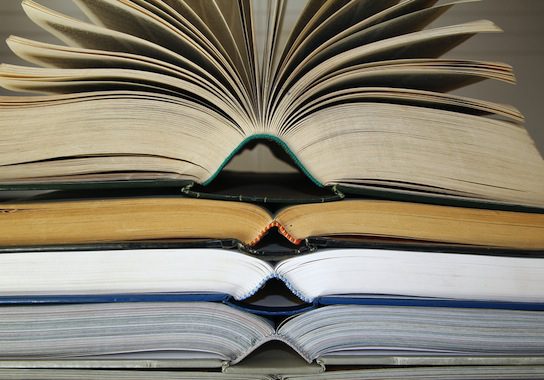The Art of Reading, Fast and Slow

Many modern readers push themselves through speed-reading courses. If they haven’t time for a full course, there are Youtube videos and websites on the subject. Now, in the age of digital reading, there are additional speed-reading gadgets: tools like Feedly and Twitter enable users to absorb small bits of text in a speedy fashion. A bunch of speed-reading apps have come into vogue, enabling users to read on the clock with greater efficiency.
Efficiency. It’s the word of the age, according to Alasdair MacIntyre: in After Virtue, he said “efficiency” is our most prized virtue. While the Greeks of Homer’s time valued virtues like duty and honor, our age preferred more “managerial” virtues, efficiency being the most valued of all.
But have we lost something in our endeavors for efficiency? Curator contributor Brett Beasley says yes. In a Monday post, he mused on our changing reading patterns, as our culture passes from speed-reading to half-reading, to complete negligence:
“Sharing” is the buzzword of our age, in which nearly all of what we read can be linked to, tweeted, emailed, attached, and downloaded within seconds. Mass digitization projects like Google Books and the Digital Public Library of America place more words within our grasp each hour, yet meanwhile we continue to hear reports that nearly a third of Americans did not read as much as one book in the past year. It’s strange, isn’t it? Reading often feels as easy as breathing. When I go on a road trip, I don’t have to make myself read the words written on the road signs and billboards. It just happens. But when it comes to anything longer than a few hundred words, the text seems to thicken and we have to push back against a surprising amount of resistance.
Why is it that we can spend significant time browsing menus and reading Buzzfeed articles, but roll our eyes when we scroll to the bottom of a new story and see the words “Page 1 of 12”? What is it about length that intimidates and frustrates us so?
At least in part, this annoyance is rooted in that modern striving for “efficiency.” We want our laughs, lunches, and letters as quickly as possible. We are increasingly aware of time’s incessant ticking: from the days in centuries past when church bells heralded the hours, minutes now flick by on our phone and computer screens. We own it, in a way that our ancestors did not. Countdown apps show us every millisecond whizzing past, set to our own schedules and deadlines.
Thus we, along with Beasley, remember “many thinkers and artists throughout history who have written and worked with a momento mori, or reminder of death, nearby. While we might pride ourselves on the nearly instantaneous speed with which we can deploy and make use of information online, in the end our time and our attention are finite, and we have to make difficult decisions about what is valuable enough to spend our time on.”
This is our second problem: in the age of information, reading is literally everywhere. News stands, Google news, even the nearest coffee shop—one needn’t go far to become bombarded with words. What shall you read first? What’s worth reading? What if you waste time reading something awful, when you could have been reading something else? “Stream, cloud, dust; now more than ever our text and our reading times are in need of a shape and an architecture,” writes Beasley. “Intentionally or unintentionally, each of us has a reading practice that shapes the way we live, think, and interact.”
What shape and architecture should we give to our reading life? One thing is certain: the way we read will affect the way we absorb information, and thus will shape the very way we live. Should we read Drudge-style—absorbing the most interesting headlines of the moment, discarding length for sensationalism? Or should we read in a more bookish, antiquated style: throwing “efficiency” to the wind, cherry-picking books we think will be the best, ignoring anything that isn’t timeless or classic?
Some would assume the latter is the “conservative” position. But it seems the best path is a narrow trail between the two extremes. There is pertinent everyday information we must absorb to make pertinent decisions. But essential information doesn’t always foster deeper human flourishing and intellectual growth. We should digest the pertinent with efficiency, but not for efficiency’s sake.
Efficiency is a means to a greater end, a greater virtue: that of wisdom. Wisdom is “the quality of having experience, knowledge, and good judgment.” To have wisdom, therefore, one must have basic knowledge of the pertinent. But “good judgment” doesn’t come from gulping down news in a frenzied fashion. Good judgment requires thoughtful, prolonged, and careful meditation. It requires outside opinions, secondary sources, and at least some research. It requires a depth of reading inspired by thoughtfulness, as well as inquisitiveness. In order to get wisdom, slow reading is necessary: a careful, deliberate inculcation of timeless truths.
The real trick, then, is determining what to read fast, and what to read slowly. Beasley references the reading traditions of the monks, and we can learn something from their style. Their reading during the Middle Ages, he says, “was the centerpiece of daily life. Several hours of reading (or lectio) often fell in the middle of the day, with the rest of the day devoted to periods of meditation, prayer, and contemplation. While lectio ‘puts whole food in the mouth,’ meditation ‘chews it and breaks it up,’ prayer ‘extracts its flavor,’ and finally contemplation ‘is the sweetness itself which gladdens and refreshens.’”
Perhaps our modern reading challenge lies in learning when lectio is the best course, and when deeper meditation or contemplation is required. We must differentiate between the times when efficiency leads us to wisdom—and when efficiency becomes a distracting end in and of itself.